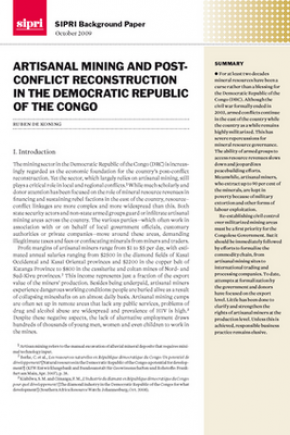Artisanal Mining and Post-conflict Reconstruction in the Democratic Republic of the Congo
Download this SIPRI Background Paper
Summary
For at least two decades mineral resources have been a curse rather than a blessing for the Democratic Republic of the Congo (DRC). Although the civil war formally ended in 2003, armed conflicts continue in the east of the country while the country as a while remains highly militarized. This has severe repercussions for mineral resource governance. The ability of armed groups to access resource revenues slows down and jeopardizes peacebuilding efforts. Meanwhile, artisanal miners, who extract up to 90 per cent of the minerals, are kept in poverty because of military extortion and other forms of labour exploitation.
Re-establishing civil control over militarized mining areas must be a first priority for the Congolese Government. But it should be immediately followed by efforts to formalize the commodity chain, from artisanal mining sites to international trading and processing companies. To date, attempts at formalization by the government and donors have focused on the export level. Little has been done to clarify and strengthen the rights of artisanal miners at the production level. Unless this is achieved, responsible business practice remains elusive.
Contents
I. Introduction
II. Decline and informality in the Congolese mining sector
III. Industrial and artisanal mining under a new mining regime
IV. Artisanal mining and security
V. International policy responses
VI. Conclusions
About the author
Ruben de Koning (Netherlands) is a Researcher with the SIPRI Armed Conflict and Conflict Management Programme. Prior to joining SIPRI he worked at the United Nations Development Programme’s Oslo Governance Centre, at the Center for International Forestry Research in Bogor, Indonesia, and Yaoundé, Cameroon, and as a consultant for Pax Christi Netherlands. He has done extensive field research in the Horn of Africa and Central Africa, where he studied interstate border disputes, small-arms violence and rebel movements in the context of natural resource scarcity and abundance. His recent publications include ‘Resource-conflict Links in Sierra Leone and the Democratic Republic of the Congo’, SIPRI Insights on Peace and Security no. 2008/2 (Oct. 2008).

